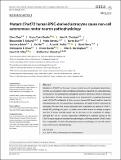Mutant C9orf72 human iPSC-derived astrocytes cause non-cell autonomous motor neuron pathophysiology
View/
Date
11/03/2020Author
Grant ID
N/A
Miles/Oct12/6290
N/A
Keywords
Metadata
Show full item recordAbstract
Mutations in C9orf72 are the most common genetic cause of amyotrophic lateral sclerosis (ALS). Accumulating evidence implicates astrocytes as important non‐cell autonomous contributors to ALS pathogenesis, although the potential deleterious effects of astrocytes on the function of motor neurons remains to be determined in a completely humanized model of C9orf72 ‐mediated ALS. Here, we use a human iPSC‐based model to study the cell autonomous and non‐autonomous consequences of mutant C9orf72 expression by astrocytes. We show that mutant astrocytes both recapitulate key aspects of C9orf72 ‐related ALS pathology and, upon co‐culture, cause motor neurons to undergo a progressive loss of action potential output due to decreases in the magnitude of voltage‐activated Na+ and K+ currents. Importantly, CRISPR/Cas‐9 mediated excision of the C9orf72 repeat expansion reverses these phenotypes, confirming that the C9orf72 mutation is responsible for both cell‐autonomous astrocyte pathology and non‐cell autonomous motor neuron pathophysiology.
Citation
Zhao , C , Devlin , A-C , Chouhan , A K , Selvaraj , B , Stavrou , M , Burr , K , Brivio , V , He , X , Mehta , A , Story , D , Shaw , C , Dando , O , Hardingham , G , Miles , G B & Chandran , S 2020 , ' Mutant C9orf72 human iPSC-derived astrocytes cause non-cell autonomous motor neuron pathophysiology ' , Glia , vol. 68 , no. 5 , pp. 1046-1064 . https://doi.org/10.1002/glia.23761
Publication
Glia
Status
Peer reviewed
ISSN
0894-1491Type
Journal article
Description
This work has been supported by: Motor Neurone Disease Association (Miles/Oct 2014/878-792), Euan MacDonald Centre, Motor Neurone Disease Scotland, Dementias Platform UK (DPUK)-MRC stem cell partnership, MS Society and UK Dementia Research Institute. C.Z was funded by China Scholarship Council. A.R.M. and M.S are funded by the Medical Research Council and the Motor Neurone Disease Association. They also acknowledge support from the Rowling Scholars scheme, administered by the Anne Rowling Regenerative Neurology Clinic, University of Edinburgh, Edinburgh, UK.Collections
Items in the St Andrews Research Repository are protected by copyright, with all rights reserved, unless otherwise indicated.

